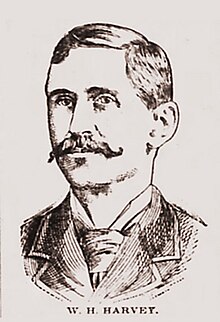William Hope Harvey
| William Hope Harvey | |
|---|---|

W.H. Harvey in 1895
|
|
| Born |
August 16, 1851 Buffalo, Virginia |
| Died | February 11, 1936 (aged 84) Monte Ne, Benton County, Arkansas |
| Nationality | American |
| Other names | "Coin" Harvey |
| Occupation | lawyer, political activist |
| Known for | "free silver" political activism |
William Hope "Coin" Harvey (August 16, 1851 – February 11, 1936) was an American lawyer, author, politician, and health resort owner best remembered as a prominent public intellectual advancing the idea of monetary bimetallism. His enthusiasm for the use of silver as legal tender was later incorporated into the platforms of both the People's Party and the Democratic Party in the early 1890s. Harvey was also the founder of the short-lived Liberty Party and that party's nominee for President of the United States in 1932.
William Hope Harvey was born on August 16, 1851 on a farm near the small town of Buffalo, Virginia (later West Virginia). He was the fifth child of six born to Robert and Anna Harvey. His father, Robert Trigg Harvey, was a Virginian of Scottish and English ancestry, and his mother, who had Virginian ancestors traceable to colonial times, was descended from French ancestors who had long since peopled the territory around nearby Gallipolis, Ohio.
Harvey was educated in local public schools before attending the Buffalo Academy from 1865 to 1867. At the end of his time there, still just 16 years old, he taught school for three months before enrolling at Marshall College in Guyandotte, Virginia. He remained there only three months before leaving to briefly teach school again. This ended his formal education, although he continued to study law, ultimately managing to gain admission to the West Virginia state bar.
After gaining his license to practice law, Harvey opened up a law practice in Barboursville, West Virginia, which proved to be a relatively successful operation. He had a good court appearance being slender, five foot ten, erect bearing and penetrating blue eyes. He was soon practicing law in Illinois and Ohio.
Early in his career, he took a case that no other attorney would. He defended a white man who married an African American woman, which was against the law in West Virginia. To close his defense Harvey asked, "Can anyone in this courtroom prove that this man has not a drop of colored blood in his veins." The case was dismissed.
...
Wikipedia
